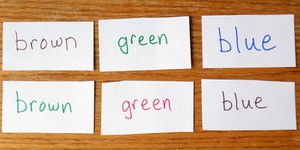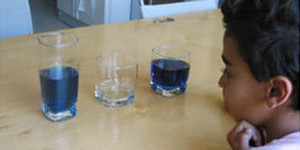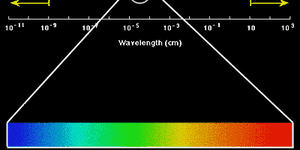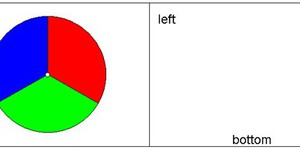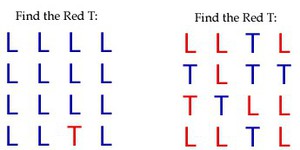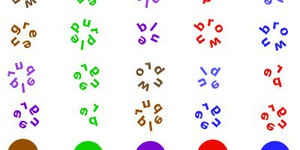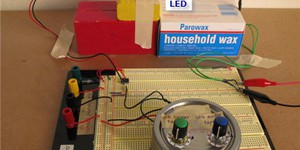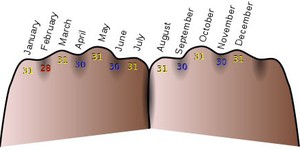Middle School, Measure Human Perception Science Projects (13 results)
Measure human perception, the ability of people to use their senses and remember what they've experienced. Collect data about the score volunteers get on a test, the time it takes them to do a task, or percentage of volunteers who have certain characteristics.
|
Can you pat your head with one hand while you rub your stomach with the other? This science project idea is kind of like doing that, but this project can actually give you some insight into how your mind works. The task is to name colors. It sounds simple enough, but see what happens when color words get in the way.
Read more
Featured
Have you heard that garlic powder is supposed to inhibit the growth of bacteria? Which do you think would make a better disinfectant: a solution of garlic powder or a solution of bleach? This project shows you a straightforward way to compare the effectiveness of different disinfectants (or other antimicrobial agents), by measuring zones of inhibition on a culture plate.
Read more
Having a younger brother or sister can be a real chore. They can get into your things and mess up all your stuff. But have you ever thought that when younger siblings do this kind of thing, they are actually learning about the world around them and how to interact with their environment? Every day, a young child's brain is getting new information about his or her environment and developing ways to organize that information. Learning about and understanding this conduct is the study of human…
Read more
New
Have you ever noticed that on a hot day, it's more comfortable to wear a light-colored shirt than a dark one? Or that it's cooler in a park than walking down a street? This happens because different surfaces absorb and reflect heat in different ways. Urban heat islands are parts of cities where man-made surfaces like pavement and buildings replace natural surfaces like grass and trees. In this project, you will use temperature and satellite data to see if certain areas in a city have higher…
Read more
You know how to make new colors by mixing paint or crayons. For example, you get green by mixing yellow and blue, or orange by mixing red and yellow. With paint, blue, yellow, and red are primary colors, which you can use to make other colors. Have you ever tried making colors with light? Are the primary colors the same ones you use for paint? Do this experiment and find out.
Read more
Yogi Berra said "You can observe a lot by just watching." In this human biology science fair project, you will observe how your eyes perceive color by watching afterimages. Afterimages are the images you see after staring at an object for several seconds and then looking away. You will also learn how different cone cells in your retina respond to different colors.
Read more
What makes you notice someone in a crowd? Why do some things stand out, while others melt into the background? In this science project you can investigate the psychology of how things get noticed, by studying how our brains perform a visual search.
Read more
New
Does your dog get bored when you are not home? Do you ever toss them a few treats right before you head out the door? What if you could keep them busy by automatically dispensing treats throughout the day? What about training them to sit in a certain place or even press a button by automatically rewarding them with treats? In this project you will build your own automatic dog (or cat, or other pet) treat dispenser that you can customize to react to different sensors.
Read more
The Stroop effect describes an experiment about the time it takes to name the color of printed words. When you try to name the color in which color words are printed, it takes longer when the color word differs from the ink color than when the color word is the same as the ink color. This project is an interesting variation: what happens if you 'warp' the words into a curved shape that is harder to recognize as a word? Will the Stroop effect still happen? How 'warped' do the words have to be in…
Read more
This project shows that our perceptions can change, even with the stimulus remains the same. A clear color difference in an image disappears after just 20 seconds of looking at another (special) image. Now you see it, now you don't!
Read more
If you want to get your friend's attention at a crowded sporting event with lots of people cheering, you need to shout. If you're trying to do the same thing in a quiet library, a whisper works. The detection limit for each of our senses depends on the amount of "background" stimulation that is already present. This project uses an LED control circuit to investigate detection of changes in light levels.
Read more
Think it's a good idea to plug into iTunes, surf the Web, or watch TV while doing homework or trying to read? Lots of people do it and claim that jumping from one activity to another keeps their attention level up and even gives their brain some time to "relax" between the more challenging tasks. Just how efficient is multitasking? In this project, you'll find out after testing the ability of volunteers to successfully do two or more things at once.
Read more
Have you ever had to remember a long list of planets or the state capitals? These kinds of lists are full of interesting facts, but they can be hard to remember, especially for tests. What could you do to remember the list better? In this human behavior science fair project, you will learn about a memory technique called mnemonics (pronounced nuh-MAH-nicks) and investigate whether using mnemonics can help you and your friends remember lists of words.
Read more
|
Explore Our Science Videos
Make a Whirlybird from Paper
DIY Mini Propeller Car
Build a Gauss Rifle


